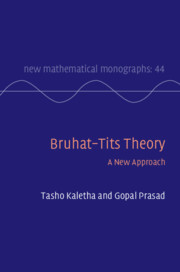Book contents
- Frontmatter
- Dedication
- Contents
- Illustrations
- Tables
- Introduction
- Part One Background and Review
- Part Two Bruhat–Tits Theory
- Part Three Additional Developments
- 10 Residue Field of Dimension 1
- 11 Component Groups of Integral Models
- 12 Finite Group Actions and Tamely Ramified Descent
- 13 Moy–Prasad Filtrations
- 14 Functorial Properties
- 15 The Buildings of Classical Groups via Lattice Chains
- Part Four Applications
- Part Five Appendices
- References
- Index of Symbols
- General Index
13 - Moy–Prasad Filtrations
from Part Three - Additional Developments
Published online by Cambridge University Press: 16 May 2023
- Frontmatter
- Dedication
- Contents
- Illustrations
- Tables
- Introduction
- Part One Background and Review
- Part Two Bruhat–Tits Theory
- Part Three Additional Developments
- 10 Residue Field of Dimension 1
- 11 Component Groups of Integral Models
- 12 Finite Group Actions and Tamely Ramified Descent
- 13 Moy–Prasad Filtrations
- 14 Functorial Properties
- 15 The Buildings of Classical Groups via Lattice Chains
- Part Four Applications
- Part Five Appendices
- References
- Index of Symbols
- General Index
Summary
Considers a connected reductive $K$-group $H$ equipped with an action of a finite group $\Theta$ and studies the relationship between the buildings of $H$ and $G=(H^\Theta)^0$, under the assumption that the order of $\Theta$ is prime to the residue field characteristic $p$. It is shown that $\cB(G/K)$ can be identified with the set of fixed points $\cB(H/K)^\Theta$, and that the facets of $\cB(G/K)$ and the associated parahoric groups can be related to those for $H$. A special case of this set-up occurs when we take a connected reductive $K$-group $G$ and set $H=\tx{R}_{L/K}(G_L)$, where $L$ is a finite tamely ramified Galois extension of $K$. The results then relate Bruhat--Tits theory for $G/L$ and $G/K$. This is called \emph{tamely ramified descent}, and the resulting isomorphism $\cB(G/L)^{\tx{Gal}(L/K)}=\cB(G/K)$ was originally obtained in the thesis of Guy Rousseau by an entirely different method.
Information
- Type
- Chapter
- Information
- Bruhat–Tits TheoryA New Approach, pp. 466 - 489Publisher: Cambridge University PressPrint publication year: 2023
